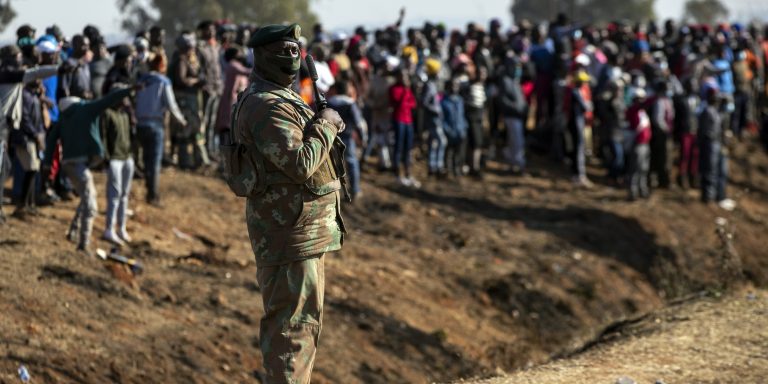INTELBRIEF
July 23, 2021
IntelBrief: Violence in South Africa Contributes to Lingering Instability

Bottom Line Up Front
- South Africa is reeling from weeks of protests and demonstrations that devolved into looting and violence, with at least 276 people killed, and thousands arrested.
- South Africa’s President Cyril Ramaphosa was criticized for his inept response to the cascading violence, triggered by the arrest of former President Jacob Zuma.
- The rioting and looting come at a time of broad unrest in South Africa due to the coronavirus, which has devastated the country following a third wave of infections.
- The violence is the worst since the end of apartheid in 1994, and the spread of the COVID-19 Delta variant leaves South Africa hard pressed to recover.
On July 8, the imprisonment of former South African President Jacob Zuma, jailed on charges of contempt of court, touched off weeks of looting, rioting, and violence. South Africa’s Constitutional Court ruled in late June that Zuma must serve a fifteen-month prison sentence for failing to appear before a commission investigating corruption during his presidency. Protests began in KwaZulu-Natal, a province located on South Africa’s eastern coast long considered a Zuma stronghold. Highways were blockaded, trucks were looted and set ablaze, and supermarkets and shops were ransacked. The chaos spread inland to Gauteng province, to Johannesburg, the country’s financial center, and to large cities such as Pretoria and Durban. At least 276 people were reported killed and thousands more arrested. The violence, some of which was organized through social media and some of which appeared opportunistic, has cost the South African economy an estimated $3.4 billion in lost output and resulted in tens of millions of dollars in property and infrastructure damage. Businesses were primarily targeted during the unrest, with some 200 malls, 3,000 shops, and 200 banks and post offices suffering damage. The protests also disrupted operations of the country’s COVID-19 vaccination program, which has vaccinated only about 4.5% of South Africa’s population to date.
South Africa’s President Cyril Ramaphosa was criticized for his inept response to the spreading unrest and cascading violence, along with his suggestions that the protests were rooted in ethnic infighting and part of an insurrection. The latter claim was denied by Ramaphosa’s own defense minister, Nosiviwe Mapisa-Nqakula. After an initial silence, Ramaphosa vowed to send the military into the street and authorized the deployment of army reservists from the South African National Defense Force (SANDF) to assist the South African Police Service. The recent flare up of violence and the bungled response from the governing African National Congress (ANC) revealed fissures in Ramaphosa’s party. Ramaphosa campaigned on and was elected to crack down on government corruption, a perennial challenge faced by the ANC since its rise to power in 1994.
The unrest comes at a time of broad volatility in South Africa due to the effects of the coronavirus. A third wave of COVID-19 infections recently devastated South Africa, further plunging the country’s economy into a tailspin, with the greatest impact felt by Black South Africans, who make up approximately 80% of the country’s population and have been most affected by joblessness and poverty even before the pandemic. Unemployment disproportionately affects the country’s youth, with rates hovering above 64% for South Africans under the age of 35 (according to AP), and a significant portion of the country has fallen below the poverty line over the course of the pandemic. While Zuma’s imprisonment may have catalyzed the protests, their development into lawlessness and violence is indicative of deeper grievances in South African society, including a lack of economic opportunities and desperation, which have progressively worsened since the global financial crisis of 2008-09. South Africa’s economy, which was in recession before the COVID-19 pandemic, contracted by 7% in 2020. As with protests and demonstrations in parts of Latin America and the Middle East, the rising cost of basic goods and necessities, combined with unemployment, has exacerbated political instability. South Africa’s regular power outages—identified as one of the biggest challenges to COVID-19 storage and delivery—and water shortages contribute further to tensions in the country.
The violence is the worst in South Africa since the end of apartheid in the mid-1990s, and the relentless spread of the COVID-19 Delta variant means that the country will be hard pressed to recover. Continued instability is a concern for foreign investors, and the precarious nature of business in South Africa means that some entrepreneurs and private sector entities could look to move abroad. In response to the violence, armed vigilantes have begun patrolling the entrances and exits to neighborhoods, businesses, and residential compounds, determined to deter looters, vandals, and criminals. In the immediate term, it is clear that Ramaphosa’s government needs to gain control of the security situation to quell the current level of violence and crime. The longer-term issues, including tackling corruption and stabilizing the economy while attempting to stem the spread of the coronavirus, will be far more challenging, and could require a more hands-on approach from the international community. Recently a member of the UN Security Council, South Africa has been seen as an important voice for the Continent and the continuing shadows of uncertainty and insecurity could risk the progress made over the past three decades.